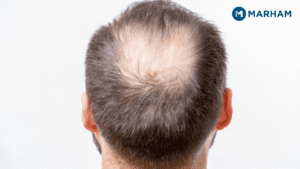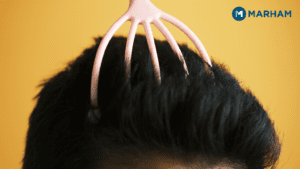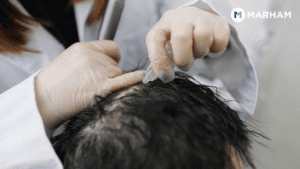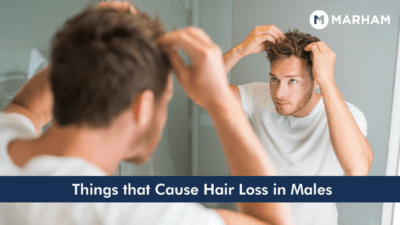Highlights:
- It is seen that on average we lose 50-100 hair strands per day.
- Hair loss in males occurs due to various genetic and other factors.
- Male pattern baldness is treatable via lifestyle modifications, medications, and transplants.
- You can also consult the best dermatologist or cosmetic surgeon for hair treatment in Pakistan.
Have you been seeing more hairs stuck in the shower drain? Does your hair come in hands when you gently caress your hair? It can be discomforting and alarming if you’re losing hair swiftly.
On average, we lose 50-100 strands per day. However, more important is if your hair strands aren’t growing back.
Male pattern baldness and hair loss in men are very common. But do you know what is causing the hair loss? And what is the appropriate treatment to regain your hair strands?
Well, in this blog, we will cover all the aspects related to hair loss in males. Moreover, we will also discuss the points when you should see a doctor for hair loss in males.
What Causes Hair Loss in Males?
Multiple reasons can cause hair loss in men. Some of the most common causes of hair loss in men are given below:
- Genetics (Heredity Factors)
Most of the time, hair loss in men is due to Male pattern baldness or androgenic alopecia. Male pattern baldness is a common predetermined genetic disorder in men. Males inherit this gene from the X chromosomes from their mothers. It occurs with aging and causes bald spots or receding hairline in men.
- Hormonal Imbalance
Men also lose hair due to hormonal imbalance. High levels of androgen i.e., a male hormone, can shrink hair follicles. This can cause fast hair fall. On the other hand, low levels of Dihydrotestosterone (DHT) i.e., a male hormone can cause slow regrowth of new hair strands.
- Age
Age is a major factor due to which hair loss occurs in males. As people age, the hair follicles shrink and cause thinner hair. With age, hormone imbalance also occurs which can cause more hair loss and less hair growth in males.
If your hair loss is not due to male pattern baldness, then your hair loss can be reversed.


- Stress
Due to chronic stress levels, hair thinning and hair loss can also occur. This condition is known as telogen effluvium. Hair loss due to stress can occur in both males and females.
- Hair Treatments and Hair Styles
Too much hair styling and hair treatments can affect your scalp health. People usually go for bleaching, hair coloring, extensions, etc, which can badly affect the thickness and growth of hair. Moreover, hot oil treatments can also irritate the hair follicles and cause weakened hair.
- Underlying Medical Conditions
Hair loss can also be a sign of any underlying conditions such as diabetes, heart problems, gout, depression, cancer, etc. Moreover, some other autoimmune diseases and hormonal problems can also cause thinning and hair loss in males.
Hair Loss Treatment For Men
Hair loss treatment for men is performed depending on the causative factors such as age, medical history, lifestyle habits, etc. Some of the most common treatment options are given below:
1. Lifestyle Modifications
One of the first things, that you should do is to make healthy lifestyle modifications. Some of the lifestyle changes that you can make are given as follows:
Scalp Massage
Hair massage not only feels good but also has several benefits. Massaging the scalp can stimulate hair follicles which promotes hair growth.
Research conducted in 2016 also showed that healthy Japanese men who got 4 minutes of scalp massage every day for 24 weeks had thicker hair. This showed that massaging hair every day is of great importance if you want healthy hair.


Quit Smoking
If you’re a smoker, then you might have heard that smoking can affect the lungs and can cause cancer. But do you know that smoking can also promote hair loss in men?
Tobacco smoke has more than 7000 chemicals that can cause hair loss and other medical conditions.
A study conducted in 2020 showed that out of 1000 men the majority who smoke have hair loss issues as compared to the non-smokers.
Balanced Diet
A balanced and healthy diet keeps your hair and health in good condition. Therefore, it is necessary to eat a healthy variety of fruits, vegetables, whole grains, lean proteins, and unsaturated fats.
Moreover, limit the use of fatty, sugary, oily, and processed foods. A study conducted in 2018 suggested that there is a relationship between minerals and vitamins found in food and healthy hair.
We have shortlisted the foods that you should use to have healthy hair:
- Foods rich in Omega-3 fatty acids (Salmon, Tuna, Egg Yolks, Mackerel, Hemp Seeds, and Walnuts)
- Iron Rich Foods (Green Leafy Vegetables, Lean Beef, Eggs, Iron Fortified Grains)
- High Protein Foods (Eggs, Seafood, Lean Meat)
- Plenty of Water
Stress Management Techniques
Stress and depression have adverse effects on the physical and mental health of a person. Stress not only affects your health but also affects hair growth and loss.
The following are the strategies to reduce stress:
- Practice Yoga
- Regular Exercise or Physical Activity
- Get Enough Sleep
- Meditation
2. Medical Interventions
If you’ve hair loss due to any underlying medical condition, then your doctor may treat that condition. Moreover, if you’ve pattern/hereditary baldness, then certain medicines are given to treat the hair loss condition.
- Minoxidil (Rogaine)
Rogaine for men is an over-the-counter medicine. It comes in foam, liquid, and shampoo forms. It approximately takes 4-6 months to show results for male pattern baldness.
- Finasteride (Propecia)
Finasteride is a prescription drug for men. It works by reducing the hair loss rate and some results have shown new hair growth. It takes approximately 3 months for the medicine to show results. It may not work for males over 60 years of age.
3. Hair Transplants and Treatments
- Platelet Rich Plasma (PRP)
Platelet-rich plasma (PRP) is a very effective treatment to treat male pattern baldness. It prevents hair loss and promotes hair growth. It is best for men who are experiencing early male pattern baldness. It is a regenerative medicine therapy in which plasma cells from your blood are separated and then injected into the bald spots.


- Hair Transplant
If the lifestyle changes or medications aren’t working, then a hair transplant is performed. It involves taking hair follicles from healthier areas of the scalp and taking them to the bald spots. It is an invasive option and it is better to talk to your doctor before you go for this option.
When Should You See a Doctor For Hair Loss?
If you notice an abnormal hair loss leading to baldness and patches, then you should see a doctor for hair restoration. Some other signs that you can also look out for are as follows:
- Hair Thinning
- Sudden Hair Loss
- Itchy Scalp
- Patchy Blad Spot
- Complete Hair Loss
If you’re facing any of the above symptoms, then you should consult the best hair transplant specialist in Pakistan.
Frequently Asked Questions (FAQs)
1. Can Lost Hair Grow Back?
In some conditions, such as patchy hair loss (alopecia areata) lost hair can grow back. Many effective treatments for hair loss are available nowadays.
2. Which Vitamin Deficiency Causes Hair Loss?
Vitamin B12, Riboflavin, biotin, and folate deficiencies can cause hair loss.

